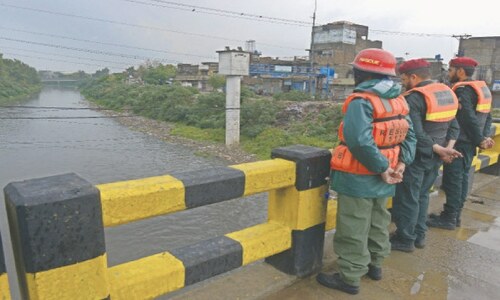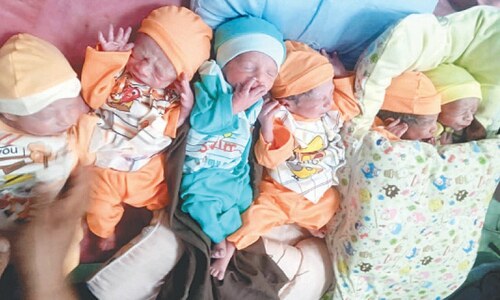ISLAMABAD: Last year, both Prime Minister Nawaz Sharif and Leader of the Opposition in the National Assembly Syed Khursheed Shah had agreed, in writing, to work together towards structural improvements in the health and education sectors, which required improved spending equal to “at least three per cent of the country’s Gross Domestic Product (GDP)”.
In their official correspondence, the two leaders also shared the viewpoint that, at the moment, the country stood nowhere when it came to performance in the fields of education and healthcare.
However, after their ‘on-paper agreement’, neither side bothered to follow up to discuss ways and means to develop affordable healthcare facilities in the country and ensure the enrolment of out-of-school-children so that Article 25-A of the Constitution could truly be implemented.
Titled ‘Right to Education’, the Article reads: “The state shall provide free and compulsory education to all children of the age of five to 16 years in such manner as may be determined by law.”
In a letter sent to the PM by Mr Shah on Sept 25, 2014, the leader of the opposition had said: “As we are aware that without educational development and health facilities, no nation can achieve the target of progress and prosperity. Governments and political parties, with strong belief in democracy, always struggle for the accomplishment of the rights of the people.”
In this letter, Mr Shah also referred to multiple international reports that presented a poor rating of the country in these two sectors.
“Unfortunately, according to [the] latest report of the (UN education department), Pakistan stands at number 180 out of 221 countries in the world, similarly our literacy rate is hardly 58 per cent and we rank very low [among] Organisation of Islamic Cooperation, Saarc and E-9 countries. Same is the case of health[care] sector, where about 80 per cent of the population is deprived of basic health facilities.”
In his letter, Mr Shah had proposed the PM sign a ‘Charter for Improvement of Education and Health Sector’ with all political parties sitting in parliament, on the lines of the Charter of Democracy that was signed between the PPP and PML-N.
On the issue of the 18th Amendment, whereby education has been transferred to provinces, the leader of the opposition had said: “The federal government should pressurise provincial governments [to] provide primary and secondary education and basic health facilities in their respective provinces. The modalities for the achievement of these objectives may be prepared and finalised in consultation with parliament, political parties and other concerned quarters.” In the concluding paragraph, Mr Shah recommended an immediate increase of the budget for both sectors to at least three per cent of the GDP.
PM’s response
Although Prime Minister Nawaz Sharif took more than a month to respond, in his reply dated Oct 31, 2014, he largely agreed with what Mr Shah had to say.
“I am writing to thank you for your letter in which you have very pertinently raised the issue of low public spending on the provision of education and healthcare. Indeed, this seems to be the most serious deficit in Pakistan’s development policy, as a result of which human development outcomes as you have also highlighted in your letter, remains deplorably low, both from international and regional standards.”
Moreover, the PM also accepted the fact that despite the passage of the 18th Amendment, the federal government “cannot abdicate its paternal obligations” in the two sectors. On low spending, the PM said his government intended to increase expenditure from the current two per cent to four per of the GDP for health and education by 2018.
In his concluding paragraph, the PM said: “I certainly look forward to working with you and other parliamentary leaders, as you have kindly suggested to formulate a consensus-driven charter for the improvement of education and health sectors.”
Lack of progress
Despite repeated attempts, nobody from the Prime Minister’s Office was available to explain whether the two sides had made some progress after agreeing to join hands for the improvement of the two key sectors.
However, Waqar Gilani, a spokesperson for the leader of opposition, told Dawn that Mr Shah was working to hold a meeting of all parliamentary parties, including provincial chief ministers, to develop a consensus for the much-needed better spending on health and education.
Mr Gilani, who is part of Mr Shah’s team working on the meeting, said whatever evidence they had collected so far reflected a “poor state of affairs when it comes to actual utilisation of funds”.
“Overall, less than two per cent of the GDP is earmarked for health and education countrywide. A lot less is released and in the end the amount of money spent on ground is any body’s guess.”
Dr Mohammad Saleem, who is member of multiple committees with the federal education ministry, told Dawn that in the next financial year, they would be able to enrol all out-of-school-children in the Islamabad Capital Territory (ICT).
“Although, we do not have the exact statistics, but the Punjab and Khyber Pakhtunkhwa governments are said to be performing well on this account as compared to the Sindh and Balochistan governments.”
Published in Dawn, April 16th, 2015
On a mobile phone? Get the Dawn Mobile App: Apple Store | Google Play















































Dear visitor, the comments section is undergoing an overhaul and will return soon.